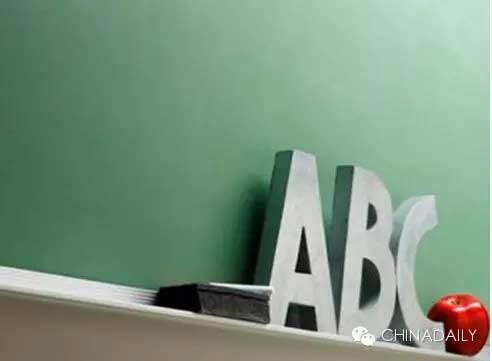當前位置: Language Tips> 雙語新聞
Language mastery in mouth of beholder
分享到
Westerners are often daunted by the thought of learning Chinese, mainly because of the perceived complexity of Chinese characters. In fact, if they knew that they’d be able to get by if they had to learn only pinyin, they might not be as tentative.
一想到學中文,很多老外就打退堂鼓,主要是覺得漢字太復雜。而如果他們知道只要學會拼音就過得去,他們也許會想試一把。
But how do Chinese feel about using English?
但中國人學英語的感覺又如何呢?

Hezi Jiang, a native of Beijing’s Chaoyang district and a China Daily USA reporter in New York, said: “There is a popular joke in China: A Chinese man flies to America. On the plane, the flight attendant approaches him and asks, ‘Coffee or tea, sir?’
《中國日報》美國版駐紐約記者、北京朝陽區居民姜禾子(音)說:“在中國有個廣為流傳的笑話:一個中國人坐飛機去美國,在飛機上空乘問他,‘需要咖啡還是茶,先生?’
“The man thought, I’ve had coffee and tea. 'I’ll have an 'or'. Thank you’, he said."
“這人想了想,自己已經有茶也有咖啡了,‘我要還是,謝謝。’”
“To me, a lot of the embarrassing things happen with ordering food,” Hezi said. “For more than a year, I never ordered salmon no matter how much I wanted to have a grilled salmon, because the word is hard to pronounce. I used to pronounce the ‘l’ in salmon, and the waiter or waitress would correct me by asking, “sam-mon”?
姜禾子說:“對我來說,點餐時經常遇到尷尬。我已經有一年多沒點過三文魚吃了,盡管我非常想吃烤三文魚。因為很難發對音。我以前總把單詞中的l字母音發出來,服務生就會糾正我,問道,‘三文魚’?”
“I found that really embarrassing, so I stopped ordering it. I had mahi mahi instead. I love the name, so easy. Also, I didn’t like it when restaurants offered special menus. The waiter would say a list of things that I had no idea of, and I would look into his or her eyes, nodding.
“我覺得很尷尬,所以我不再點三文魚吃了。我點鲯鰍魚,我喜歡這個名字,很好發音。我也不喜歡餐廳提供專門的菜單,服務生說的一長串我都不懂,我只能看著他或她的眼睛,點點頭。”
“But it feels great when I can understand an item or two he or she said. Most times, I would order that thing just to prove that I could understand.
“但如果服務生說的其中一兩樣我能聽懂,我就感覺很棒。大多數時候,我就點我能聽懂的來吃,就為了證明我能聽懂。”
“I also found that we say ‘yes’ a lot when we don’t understand. I remember once at a brunch, a waiter asked my friend “white or wheat”?
“我還發現,當我們聽不懂時,說‘是’的時候太多了。我記得有次在早午餐會,有位服務生問我朋友,‘白面包還是全麥面包’?”
“He said ‘yes’.
“他說‘是’。”
“We laughed, and he blushed. Ordering food is hard.”
“我們都笑了,他臉刷一下就紅了,點餐最難。”
“I remember when I was preparing for the IELTS (International English Language Testing System) three years ago,” recalled Long Yifan, an intern at China Daily USA in New York, from Shaoyang, Hunan province. “I tended to use the newly grasped academic words for oral English practice.
“記得三年前我備考雅思時,我總想在英語口語練習中使用最新掌握的學究詞,”《中國日報》美國版駐紐約實習生龍一帆(音)說。
“I had some friends from Scotland, and one day when we ate out, I was in a hurry to find a restroom. I wanted to express my situation in an academic and formal way, so I said I wanted to ‘discharge’ myself. They were all surprised and amused.
“我有幾位來自蘇格蘭的朋友。一天我們約出去吃飯,我著急找廁所。我想以正式的口吻用學究詞表達我的處境,所以我說我想去‘排放’我自己。他們很驚訝,也覺得很搞笑。”
“I felt something was wrong and wanted to make a clarification, so I said I wanted to urinate. They all burst into laughter.”
“我知道說錯了,想澄清一下,所以我說我想去小便。他們笑成一片。”
“Just like how learning Chinese is hard for English speakers, the reverse is also true, for many of the same reasons,” writes Andy Luan on Quora, a question-and-answer website. “Pronunciation is probably the hardest part of learning English at first.
“就像說英語的人學中文很難一樣,中國人學英語也會因為各種同樣的原因遇到很多困難,” Andy Luan在問答網站Quora上寫道,“最初學英語時,最難的可能是發音。”

“Grammar is next. English grammar is ridiculous. There are a few so-called ‘rules’, but just about everything seems to be an exception to these rules.”
“其次是語法。英語語法很搞笑,有一些所謂的‘規則’,但幾乎都可以有例外。”
One of my observations is that Chinese speakers tend to have trouble with third-person pronouns (he and she aren’t interchangeable in English) and collective plurals.
我注意到,講中文的人經常把英文中的第三人稱代詞和集體名詞單復數搞錯(英文中的他和她不能互換)。
Many English words are the same in the singular as in the plural, so sometimes you will hear someone talk about the “researches” they did for a story, which is nonetheless endearing.
很多英文單詞的單復數形式沒差別,因此有時你會聽到有人說為一篇文章做了“很多調查研究”,但這么說也很討喜。
Vocabulary
brunch: 早午餐
white or wheat: white bread or wheat bread,白面包/全麥面包
英文來源:中國日報William Hennelly
翻譯&編輯:yaning
上一篇 : 科比告別賽票價刷新歷史
下一篇 : 旅游地風光背后的臟亂差
分享到
關注和訂閱


電話:8610-84883645
傳真:8610-84883500
Email: languagetips@chinadaily.com.cn